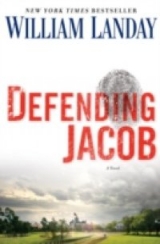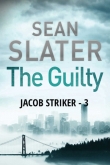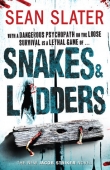
Текст книги "Defending Jacob"
Автор книги: William Landay
Соавторы: William Landay
Жанр:
Криминальные детективы
сообщить о нарушении
Текущая страница: 6 (всего у книги 25 страниц)
“You’ve been going like this for how long?”
“A couple hours maybe. Something like that.”
“Just like this? Deny, deny, deny?”
“Yeah. It’s useless.”
“Do it again.”
“Do it again? Are you kidding? How long have you been watching?”
“I just got here, Duff, but what else can we do? He’s our only real suspect. A little boy is dead; this guy likes little boys. He’s already given you the fact he was in the park that morning. He knows the area. He’s there every morning, so he knows the routine, he knows kids walk through those woods every morning. He’s certainly big enough to overpower the victim. That’s motive, means, and opportunity. So I say stay with it till he gives you something.”
Duffy’s eyes flicked to the other cops in the room then back to me. “His lawyer’s about to shut it down anyway, Andy.”
“Then there’s no time to waste, is there? Get back in there. Get me a confession and I’ll take it to the grand jury this afternoon.”
“Just get you a confession? Just like that?”
“That’s why you get the big bucks, pal.”
“What about the kids at the school? I thought that’s where we were headed.”
“We’ll keep looking at it, Duff, but what do we have, really? A bunch of freaked-out kids running their mouths on Facebook? So what? Look at this guy. Just look at him. Name me a better suspect. We don’t have one.”
“You really believe that, Andy? This is the guy, you think?”
“Yes. Maybe. Maybe. But we need something real to prove it. Get me a confession, Duff. Get me the knife. Get me anything. We need something.”
“Okay, then.” Duffy looked resolutely at the Newton detective who was his partner on this case. “We do it again. Like the man says.”
The cop hesitated, appealing to Duffy with his eyes. Why waste time?
“We do it again,” Duffy repeated. “Like the man says.” Mr. Logiudice: They never got the chance, did they? The detectives never got back into the interrogation room with Leonard Patz that day. Witness: No, they did not. Not that day or any other day. Mr. Logiudice: How did you feel about that? Witness: I thought it was a mistake. Based on what we knew at the time, it was a mistake to turn away from Patz as a suspect so early in the investigation. He was our best suspect by far. Mr. Logiudice: You still believe that? Witness: Without a doubt. We should have stayed on Patz. Mr. Logiudice: Why? Witness: Because that’s where the evidence was pointing. Mr. Logiudice: Not all the evidence. Witness: All? You never have all the evidence pointing in one direction, not in a tough case like this one. That’s precisely the problem. You don’t have enough information, the data is incomplete. There is no clear pattern, no obvious answer. So detectives do what all people do: they form a narrative in their head, a theory, and then they go looking in the data for evidence to support it. They pick a suspect first, then they look for the evidence to convict him. And they stop noticing evidence that points at other suspects. Mr. Logiudice: Like Leonard Patz. Witness: Like Leonard Patz. Mr. Logiudice: Are you suggesting that’s what happened here? Witness: I’m suggesting mistakes were made, yes, certainly. Mr. Logiudice: So what is a detective supposed to do in this situation? Witness: He has to be wary of locking onto one suspect too soon. Because if he guesses wrong, he will miss evidence pointing him toward the right answer. He’ll miss even obvious things. Mr. Logiudice: But a detective has to form theories. He has to focus on suspects, usually before he has clear evidence against them. What else can he do? Witness: That’s the dilemma. You always start with a guess. And sometimes you guess wrong. Mr. Logiudice: Did anyone guess wrong in this case? Witness: We didn’t know. We just didn’t know. Mr. Logiudice: All right, go on with your story. Why didn’t the detectives go on interrogating Patz?
An older man with a battered lawyer’s bag came into the detective bureau. His name was Jonathan Klein. He was short, slight, a little stooped. He wore a gray suit with a black turtleneck. His hair was long and strikingly white. He swept it straight back over his head where it hung over the back of his collar. He had a white goatee as well. He said in a soft voice, “Hello, Andy.”
“Jonathan.”
We shook hands with real warmth. I always liked and respected Jonathan Klein. Bookish and vaguely bohemian, he was unlike me. (I am as conventional as white toast.) But he did not lecture or lie, which set him apart from his brethren in the defense bar, who had only a casual regard for the truth, and he was genuinely smart and knew the law. He was-there is no other word for it-wise. Also, it must be said, I had a childish attraction to men of my father’s generation, as if I still harbored a faint hope of being unorphaned, even at this late date.
Klein said, “I’d like to see my client now.” His voice was soft-it was naturally soft, this was not an affectation or a tactic-so that the room tended to grow quiet around him. You found yourself leaning in close to make out what he was saying.
“I didn’t know you were representing this guy, Jonathan. Kind of a low-rent case for you, isn’t it? Some crummy pedophile ball-grabber? It’s bad for your reputation.”
“Reputation? We’re lawyers! Anyway, he’s not here because he’s a pedophile. We both know that. This is a lot of cops to put on a case about ball-grabbing.”
I stepped aside. “All right. He’s right in there. Go on in.”
“You’ll turn off the camera and the microphone?”
“Yeah. You want to use another room instead?”
“No, of course not.” He smiled gently. “I trust you, Andy.”
“Enough to let your man keep talking?”
“No, no. I trust you too much for that.”
And that was the end of Patz’s Q amp;A.
Nine-thirty P.M.
Laurie lay on the couch gazing at me, her book tented on her belly. She wore a brown V-neck shirt with a wreath of chunky embroidery around the neck, and her tortoiseshell reading glasses. Over the years she had found a way to carry her younger style into middle age; she had upgraded the embroidered peasant blouses and ripped jeans of her brainy funkster teens for a more elegant, tailored version of the same look.
She said, “Do you want to talk about it?”
“Talk about what?”
“Jacob.”
“We already did.”
“I know, but you’re brooding.”
“I’m not brooding. I’m watching TV.”
“The Cooking Channel?” She smiled, warmly skeptical.
“There’s nothing else on. Anyway, I like cooking.”
“No, you don’t.”
“I like watching cooking.”
“It’s okay, Andy. You don’t have to if you’re not ready.”
“It’s not that. It’s just there’s nothing to say.”
“Can I ask you one question?”
I rolled my eyes: Does it matter if I say no?
She picked up the remote from the coffee table and switched off the TV. “When we talked to Jacob today, you said you didn’t think he did anything, but then you turned around and cross-examined him.”
“No, I didn’t.”
“You did. You never accused him of anything, exactly, but your tone was… prosecutorial.”
“It was?”
“A little.”
“I didn’t mean for it to be. I’ll apologize to him later.”
“You don’t have to apologize.”
“I do, if that’s how I came off.”
“I’m just asking why. Is there anything you’re not telling me?”
“Like what?”
“Whatever made you go after him that way.”
“I didn’t go after him. Anyway, no, I was just upset about the knife. And what Derek wrote on Facebook.”
“Because Jacob’s had some behavioral-”
“Jesus, Laurie, come on. Be serious. This is just some kids gossiping. If I could get my hands on Derek. That was incredibly stupid, what he wrote. Honestly, sometimes I think that kid isn’t all there.”
“Derek’s not a bad kid.”
“Will you still say that when Jacob gets a knock on the door one day?”
“Is that a real possibility?”
“No. Of course not.”
“Do we have any responsibility here?”
“You mean, is it our fault somehow?”
“Fault? No. I mean, do we have to report it?”
“No. God, no. There’s nothing to report. It’s not a crime to have a knife. It’s not a crime to be a stupid teenager either-thank God, or we’d have to throw half of ’em in the can.”
Laurie nodded neutrally. “It’s just, he’s been accused, and now you know about it. And it’s not like the cops aren’t going to find it anyway; it’s right there on Facebook.”
“It’s not a credible accusation, Laurie. There’s no reason to bring the whole world down on Jake’s head. The whole thing is ridiculous.”
“Is that what you really think, Andy?”
“Yes! Of course. Don’t you?”
She searched my face. “Okay. So this isn’t what’s bothering you?”
“I already told you: nothing’s bothering me.”
“Really?”
“Really.”
“What did you do with the knife?”
“I got rid of it.”
“Got rid of it where?”
“I threw it away. Not here. In a Dumpster somewhere.”
“You covered for him.”
“No. I just wanted that knife out of my house. And I didn’t want anyone using it to make Jacob look guilty when he’s not. That’s all.”
“How is that different from covering for him?”
“You can’t cover for someone who didn’t do anything wrong.”
She gave me a searching look. “Okay. I’m going up to bed. You coming?”
“In a little while.”
She got up, came over to plow her fingers through my hair and kiss my forehead. “Don’t stay up too late, sweetheart. You won’t be able to get up in the morning.”
“Laurie, you didn’t answer my question. I asked you what you think? Do you agree it’s ridiculous to think Jacob did this?”
“I think it’s very hard to imagine, yes.”
“But you can imagine it?”
“I don’t know. You mean you can’t, Andy? You can’t even imagine it?”
“No, I can’t. This is our son we’re talking about.”
She pulled back from me visibly, cautiously. “I don’t know. I guess I can’t imagine it either. But then I think: when I woke up this morning, I could not have imagined that knife.”
8
The End
Sunday, April 22, 2007, ten days after the murder.
On a raw, drizzly morning, hundreds of volunteers turned out to sweep Cold Spring Park for the missing knife. They were a cross-section of the town. Kids from the McCormick, some who had been friends with Ben Rifkin, some who were clearly from other school tribes-jocks, geeks, kittenish good girls. There were lots of young mothers and fathers. A few of the activist macher s who were constantly organizing community efforts of one kind or another. All these assembled in the morning damp, listened to instructions from Paul Duffy about how the search would proceed, then in teams they tromped off across the spongy wet ground to search their assigned quadrants of the woods for the knife. There was a determined mood to the whole adventure. It was a relief for everyone to do something finally, to be admitted into the investigation. Soon, they were sure, the whole thing would be resolved. It was the waiting, the uncertainty that was wearing them down. The knife would end all that. It would bear fingerprints or blood or some other morsel that would unlock the mystery, and the town would finally be able to exhale. Mr. Logiudice: You didn’t take part in the search, did you? Witness: No, I did not. Mr. Logiudice: Because you knew it was a fool’s errand. The knife they were looking for had already been found in Jacob’s dresser drawer. And you had already dumped it for him. Witness: No. I knew that was not the knife they were looking for. There was no doubt in my mind. Zero. Mr. Logiudice: Then why didn’t you join the search? Witness: A prosecutor never takes part in his own searches. I couldn’t risk becoming a witness in my own case. Think about it: if I were the one to find the murder weapon, I’d have become an essential witness. I’d be forced to cross the courtroom and take the stand. I’d have to give up the case. That’s why a good prosecutor always hangs back. He waits at the police station or out on the street while a search warrant is executed, he watches from the next room while a detective conducts an interrogation. That is Prosecution 101, Neal. It’s standard procedure. It’s exactly what I taught you, once upon a time. Maybe you weren’t listening. Mr. Logiudice: So it was for technical reasons? Witness: Neal, no one wanted the search to succeed as much as I did. I wanted my son to be proven innocent. Finding the real knife would have accomplished that. Mr. Logiudice: You’re not the least bit troubled by the way you disposed of Jacob’s knife? Even now, knowing what happened? Witness: I did what I thought was right. Jake was innocent. It was the wrong knife. Mr. Logiudice: Of course you weren’t willing to test that theory, were you? You didn’t submit the knife for forensic testing, for fingerprints or blood or fiber traces, as you threatened Jacob you might? Witness: It was the wrong knife. I did not need a test to confirm that for me. Mr. Logiudice: You already knew. Witness: I already knew. Mr. Logiudice: What was it-what made you so sure? Witness: I knew my son. Mr. Logiudice: That’s it? You knew your son? Witness: I did what any father would do. I tried to protect him from his own stupidity. Mr. Logiudice: Okay. We’ll leave it. All right, so while the others searched in Cold Spring Park that morning, you waited where? Witness: In the parking lot at the entrance to the park. Mr. Logiudice: And at some point Mr. Rifkin, the victim’s father, appeared? Witness: Yes. When I first saw him, he was coming from the direction of the woods. There are playing fields at the front of the park there, soccer fields, baseball. That morning the fields were empty. It was just a huge flat open grassy expanse. And he was making his way across it toward me.
This will always be my lasting image of Dan Rifkin alone in his misery: a small figure meandering across this massive green space, head bowed, arms thrust down into his coat pockets. The wind kept blustering him off course. He zigzagged like a little boat tacking upwind.
I went out onto the fields to meet him, but we were some distance apart and the crossing took time. For an awkward interval we watched each other approach. What must we have looked like from above? Two tiny forms inching across an empty green field toward a meeting somewhere in the center.
As he drew close, I waved. But Rifkin did not return the gesture. Thinking he was upset by accidentally running across the search, I made a churlish note to ream out the victim advocate who had forgotten to warn Rifkin away from the park that day.
“Hey, Dan,” I said in a wary tone.
He wore aviator sunglasses, though the weather was gray, and his eyes showed dimly through the lenses. He stared up at me, his eyes behind those lenses as huge and inexpressive as a fly’s. Angry, apparently.
“Are you okay, Dan? What are you doing here?”
“I’m surprised to see you here.”
“Yeah? Why is that? Where else would I be?”
He snorted.
“What is it, Dan?”
“You know”-his tone going philosophical-“I’ve had the strangest feeling lately, like I’m onstage and all the people around me are actors. Everyone in the world, every single person rushing around me on the sidewalk, they march around with their noses up in the air pretending like nothing has happened, and I’m the only one who knows the truth. I’m the only one who knows Everything Has Changed.”
I nodded, benign, indulging him.
“They’re false. You know what I mean, Andy? They’re pretending.”
“I can only imagine how you must feel, Dan.”
“I think maybe you’re an actor too.”
“Why do you say that?”
“I think you’re false.” Rifkin took off his sunglasses, folded them carefully, and stowed them in an inside pocket of his jacket. The bags under his eyes had darkened since I saw him last. His olive skin had taken on a grayish pallor. “I hear you’re being taken off the case.”
“What? You heard that from who?”
“Doesn’t matter who. I just want you to know: I want another DA.”
“Okay, well, that’s something we can talk about, certainly.”
“There’s nothing to talk about. It’s already done. Go call your boss. You need to talk to your own people. I told you, I want another DA. Someone who won’t just sit on the case. And that’s going to happen now.”
“Sit on the case? Dan, what the hell are you talking about?”
“You said everything was being done. What was being done, exactly?”
“Look, it’s been a hard case, I acknowledge-”
“No, no, it’s more than that and you know it. Why haven’t you pressed those kids? Still, to this day? I mean, really put the screws to them? That’s what I want to know.”
“I have talked to them.”
“Including your own kid, Andy?”
My mouth fell open. I extended my hand toward him, to touch his arm, to connect, but he raised his arm as if to backhand it away.
“You’ve been lying to me, Andy. All along you’ve been lying.”
He looked off toward the trees. “Do you know what bothers me, Andy? About being here, in this place? It’s that for a while-for a few minutes, maybe just a few seconds, I don’t know how long-but for some amount of time my son was alive here. He was out there lying in some fucking wet leaves, bleeding to death. And I wasn’t here with him. I was supposed to be here to help him. That’s what a father does. But I didn’t know. I was off somewhere, in the car, in my office, talking on the phone, whatever it was I was doing. Do you understand that, Andy? Do you have any idea how that feels? Can you even imagine it? I saw him get born, I saw him take his first steps and… and learn to ride a bike. I took him to his first day of school. But I wasn’t here to help him when he died. Can you imagine how that feels?”
“Dan,” I said weakly, “why don’t I get a cruiser down here to drive you home? I don’t think it’s good for you to be here. You should be with your family.”
“I can’t be with my family, Andy, that’s the fucking point! My family is dead.”
“Okay.” I looked down at the ground, at his white sneakers spattered with mud and pine needles.
“I’ll tell you something,” Rifkin added. “It doesn’t matter what happens to me now. I could become a… a drug addict or a thief or a bum. It just doesn’t matter what happens to me from here. Why should it? Why should I care?”
He said this with a bitter snarl.
“Call your office, Andy.” A beat. “Go on, call. It’s over. You’re out.”
I took out my cell phone and called Lynn Canavan directly on her cell. It rang three times. I could imagine her reading the caller ID window, preparing herself to answer.
“I’m at the office,” she said. “Why don’t you come down here right away.”
I told her, as Rifkin looked on with satisfaction, that if she had something to say, she could say it right then and save me the trip.
“No,” she insisted. “Come to the office, Andy. I want to talk to you face-to-face.”
I snapped the phone shut. I wanted to say something to Rifkin, good-bye or good luck or some valedictory bullshit, who knew what? Something told me he was right and this was good-bye. But he did not want to hear it. His posture announced as much. He had already assigned me a villain’s role. Probably he knew more than I did, anyway.
I left him on that green field and drove across the river to Cambridge in a defeated reverie. I was resigned to the fact that I would be removed from the case; it simply did not make sense that Rifkin would have come up with that on his own. Somebody had tipped him off, probably Logiudice, whose Iago whispers in the district attorney’s ear had finally won the day. Okay, then. I would be removed for a conflict of interest, a technicality. I had been outmaneuvered, that was all. It was office politics, and I was an apolitical guy, always had been. So Logiudice would have his high-profile case, and I would move on to the next file, the next body, the next case to enter the funnel. I still believed all this, foolish or delusional or rationalizing as I was. I still did not see what was coming. There was so little evidence pointing to Jacob-a schoolgirl with a secret, some kids gossiping on Facebook, even the knife. As evidence these were nothing. Any semicompetent defense lawyer would swipe them aside like cobwebs.
At the courthouse, there were no fewer than four plainclothes troopers waiting at the front door to meet me. I recognized them all as CPAC guys but I knew only one very well, a detective named Moynihan. They escorted me like a Praetorian guard through the courthouse lobby to the district attorney’s office, then through cubicles and hallways abandoned on a Sunday morning, to Lynn Canavan’s corner office.
There were three people there, seated at the conference table, Canavan, Logiudice, and a press guy named Larry Siff, whose constant presence at Canavan’s side for the past year or so had been a discouraging sign of the permanent campaign. I had no beef with Siff personally, but I despised his intrusion into a sacred process to which I had devoted my life. Most of the time he did not even have to speak; his mere presence ensured that political implications would be considered.
District Attorney Canavan said, “Sit down, Andy.”
“Did you really think you needed all this, Lynn? What did you think I was going to do? Jump out the window?”
“It’s for your own good. You know how it goes.”
“How what goes? I feel like I’m under arrest.”
“No. We just have to be careful. People get upset. They react unpredictably. We don’t want any scenes. You’d have done the same thing.”
“Not true.” I sat down. “So what am I going to be upset about?”
“Andy,” she said, “we have some bad news. On the Rifkin case? The print on the victim’s sweatshirt? It’s your son Jacob’s.” She slid a stapled report toward me.
I scanned the report. It was from the State Police Crime Lab. The report identified a dozen points of comparison between the latent found at the murder scene and one of the knowns on Jacob’s print card, much more than the standard eight required for a positive match. It was the right thumb: Jacob had reached out and grabbed the victim by his unzipped sweatshirt, leaving the print on that inside tag.
I said, bewildered, “I’m sure there’s some explanation.”
“I’m sure there is.”
“They go to the same school. Jacob is in his class. They knew each other.”
“Yes.”
“It doesn’t mean-”
“We know, Andy.”
They looked at me with pity. All except for the younger troopers, now standing by the window, who did not know me and could still despise me as they would any other bad guy.
“We’re putting you on paid leave. It’s partly my fault: it was a mistake to let you have the case in the first place. These guys”-she gestured toward the troopers-“will go to your office with you. You can take your personal belongings. No papers, no files. You’re not to touch the computer. Your work product belongs to the office.”
“Who’s taking the case?”
“Neal is.”
I smiled. Of course he is.
“Andy, do you object to Neal trying the case for some reason?”
“Does it matter what I think, Lynn?”
“Maybe, if you can make a case.”
I shook my head. “No. Let him have it. I insist.”
Logiudice looked away, avoiding my eyes.
“Have you arrested him?”
More eyes darting around the room, avoiding me.
“Lynn, have you arrested my son?”
“No.”
“Are you going to?”
Logiudice cut in, “We don’t have to tell you that.”
Canavan put out her hand to still him. “Yes. We don’t have much choice, in the circumstances.”
“In the circumstances? What circumstances? You think he’s going to take off for Costa Rica?”
She shrugged.
“You already have the warrant?”
“Yes.”
“Lynn, you have my word: he’ll turn himself in. You don’t need to arrest him. He doesn’t belong in a jail, even for one night. He’s no flight risk, you know that. He’s my son. He’s my son, Lynn. I don’t want to see him arrested.”
“Andy,” the district attorney advised, waving away my pleading like smoke, “it’d probably be best for everyone if you stayed away from the courthouse for a while. Let the dust settle. Okay?”
“Lynn, I’m asking you as a friend, as a personal favor: please, don’t arrest him.”
“It’s not a close call, Andy.”
“Why? I don’t understand. Because of a fingerprint? One fucking fingerprint? That’s all there is? You must have more. Tell me there’s more.”
“Andy, I suggest you go get a lawyer.”
“Get a lawyer? I am a lawyer. Tell me why you’re doing this to my son. You’re destroying my family. I have a right to know why.”
“I’m just reacting to the evidence, that’s all.”
“The evidence points to Patz. I’ve told you that.”
“There’s more than you’re aware of, Andy. Much more.”
It took me a moment to absorb the implications of that. Just a moment, though. I folded my cards and determined that from then on, I would show them nothing.
I stood up. “Okay. Let’s get moving.”
“Just like that?”
“Was there anything else you wanted to say to me? You, Neal?”
Canavan said, “You know, we’re still concerned about you. Whatever your son… may have done, he’s not you. You and I go back a ways, Andy. I don’t forget that.”
I felt my face go hard, as if I was peering through the eye-holes of a stone mask. I looked only at Canavan, my old friend whom I still loved and still, despite everything, trusted. I did not dare glance at Logiudice. There was a wild energy rushing into my right arm. In that moment I felt that if I so much as looked at him, my hand would flash out, snatch up his throat, and crush it.
“Are we done here?”
“Yes.”
“Good. I have to go. I have to find my family right away.”
District Attorney Canavan’s face was wary. “You okay to drive, Andy?”
“I’m fine.”
“All right. These guys will go with you to your office.”
In my office I tossed a few things into a cardboard box, papers and desk-debris, pictures plucked off the wall, the little souvenirs of years of work. An axe handle, evidence from a case I had never been able to push through the grand jury. It all fit into one cardboard box, all the years, the work, the friendships, the respect I had accumulated by little spoonfuls in case after case. All gone now, no matter how Jacob’s case turned out. For even if Jacob was cleared, I would never escape the stain of the accusation. A jury could only declare my son “not guilty,” never “innocent.” The stink would never leave us. I doubted I would ever walk into a courtroom again as a lawyer. But things were racing too fast to linger over the past or future. There was only now.
I was not panicked, oddly. I never did lose my nerve. Jacob’s homicide charge was a grenade-we would all inevitably be destroyed by it; only the details remained to be worked out-but a strange, calm urgency came over me. Surely a search warrant team was already on its way to my home. That may even have been why the DA had brought me all the way down here: to keep me out of that house before it could be searched. It was exactly what I would have done.
I bolted out of the office.
I called Laurie’s cell from the car. No answer. “Laurie, it’s very, very important. Call me back right away, the second you get this message.”
I called Jacob’s cell phone too. No answer.
I got home too late: four Newton cruisers were already parked outside, watching, freezing the house while they waited for the warrant to arrive. I continued around the block and parked.
My house is adjacent to a train stop on the suburban commuter-train line. An eight-foot fence separates the platform from my backyard. I spidered over it easily. There was so much adrenaline in me, I could have clambered up Mount Rushmore.
In my yard, I pushed through the arbor vitae at the edge of the lawn. The leaves flicked and needled across me as I bodied through the bushes.
I ran across my backyard. My neighbor was in his backyard, gardening. He waved to me, and out of neighborly reflex I waved back as I sprinted by.
Inside, I called out quietly for Jacob. To prepare him for what was coming. No one was home.
I bolted up the stairs, into Jacob’s room, where I yanked open drawers, the closet, tossed up the laundry piles on the floor, desperate to find anything remotely incriminating and get rid of it.
Does that sound awful to you? I hear the little voice in your head: Destruction of evidence! Obstruction of justice! You are naive. You imagine the courts are reliable, that wrong results are rare, and therefore I ought to have trusted the system. If he truly believed Jacob was innocent, you are thinking, he would have simply let the police sweep in and take whatever they liked. Here is the dirty little secret: the error rate in criminal verdicts is much higher than anyone imagines. Not just false negatives, the guilty criminals who get off scot-free-those “errors” we recognize and accept. They are the predictable result of stacking the deck in defendants’ favor as we do. The real surprise is the frequency of false positives, the innocent men found guilty. That error rate we do not acknowledge-do not even think about-because it calls so much into question. The fact is, what we call proof is as fallible as the witnesses who produce it, human beings all. Memories fail, eyewitness identifications are notoriously unreliable, even the best-intentioned cops are subject to failures of judgment and recall. The human element in any system is always prone to error. Why should the courts be any different? They are not. Our blind trust in the system is the product of ignorance and magical thinking, and there was no way in hell I was going to trust my son’s fate to it. Not because I believed he was guilty, I assure you, but precisely because he was innocent. I was doing what little I could to ensure the right result, the just result. If you do not believe me, go spend a few hours in the nearest criminal court, then ask yourself if you really believe it is error-free. Ask yourself if you would trust your child to it.
In any event, I did not find anything even remotely worrisome in Jake’s room, just the usual teenage junk, dirty laundry, sneakers molded to the shape of his enormous feet, schoolbooks, video-gamer mags, charging cables for his various electronics. I don’t know what I expected to find, really. The trouble was that I did not know what the DA had yet, what made them so anxious to charge Jacob, and it made me crazy wondering what that missing piece could be.
I was still tossing the room when my cell phone rang. It was Laurie. I told her to get home right away-she was visiting a friend in Brookline, twenty minutes away-but I did not tell her anything more. She was too emotional. I did not know how she would react and I did not have time to deal with her. Help Jacob now, fix Laurie later. “Where’s Jacob?” I asked. She did not know. I hung up on her.








